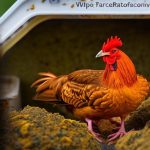Pigs and chickens have a long-standing history of coexistence on farms and homesteads. This relationship is rooted in the natural protective instincts of pigs and the mutual benefits derived from their cohabitation. Pigs are recognized for their intelligence, strength, and protective nature, while chickens are more vulnerable to predators due to their small size and limited defensive capabilities.
By understanding the dynamics of this relationship, farmers and homesteaders can leverage the natural behaviors of pigs to enhance the safety of their chicken populations. The practice of keeping pigs and chickens together has persisted for centuries, as these animals complement each other in various ways. Pigs, being natural foragers, contribute to maintaining cleanliness in the chicken coop area by consuming leftover food scraps and insects.
In turn, chickens benefit from the protection that pigs offer against potential predators. This symbiotic relationship has proven effective in fostering a harmonious environment for both species, making it a common choice among farmers and homesteaders.
Table of Contents
- 1 The natural instincts of pigs as protectors
- 2 How pigs can deter predators from attacking chickens
- 3 The benefits of keeping pigs and chickens together
- 4 Considerations for keeping pigs and chickens together
- 5 Other ways to protect chickens from predators
- 6 the potential for pigs to keep predators away from chickens
- 7 FAQs
Key Takeaways
- Pigs and chickens have a mutually beneficial relationship, with pigs acting as protectors for the chickens.
- Pigs have natural instincts to protect their territory and can be trained to protect chickens from predators.
- Pigs can deter predators such as foxes and raccoons from attacking chickens by their presence and vocalizations.
- Keeping pigs and chickens together can lead to a more efficient use of resources and a healthier environment for both animals.
- Considerations for keeping pigs and chickens together include providing adequate space, shelter, and ensuring the pigs are properly trained to protect the chickens.
- Other ways to protect chickens from predators include using secure coops, electric fencing, and guard animals such as dogs.
- In conclusion, pigs have the potential to effectively keep predators away from chickens, making them valuable additions to a poultry farm.
The natural instincts of pigs as protectors
Intelligence and Adaptability
In addition to their territorial nature, pigs are highly intelligent animals, capable of learning and adapting to their environment. This intelligence enables them to recognize potential threats to the chickens and take action to protect them. Pigs have been observed to form strong bonds with other animals, including chickens, and will often assume a protective role towards them.
Effective Companionship
Their natural instincts make pigs an ideal companion for chickens, providing an added layer of security against potential predators. By having pigs in the vicinity, chicken owners can rest assured that their flock is better protected from harm.
A Winning Combination
The combination of a pig’s protective instincts, intelligence, and adaptability makes them a valuable asset to any chicken coop. By harnessing these natural abilities, pig-chicken companionship can provide a safer and more secure environment for both species.
How pigs can deter predators from attacking chickens

Pigs can deter predators from attacking chickens in several ways. Their territorial nature and strong sense of smell make them effective at detecting the presence of predators and warding them off. Pigs will often vocalize or display aggressive behavior towards potential threats, signaling to the predators that they are not welcome in the area.
This can be enough to deter many predators from attempting to attack the chickens. In addition to their vocalizations and aggressive behavior, pigs can also physically defend the chicken coop area from predators. Their size and strength make them formidable opponents for many predators, and they are capable of fending off attacks if necessary.
Pigs have been known to chase away predators such as foxes, raccoons, and even stray dogs, effectively protecting the chickens from harm.
The benefits of keeping pigs and chickens together
There are numerous benefits to keeping pigs and chickens together on a farm or homestead. One of the main benefits is the added layer of protection that pigs provide for the chickens. Pigs can deter predators from attacking the chicken coop, creating a safer environment for the chickens to roam freely.
This can reduce the risk of losses due to predation and ultimately increase the overall productivity of the chicken operation. In addition to protection, pigs can also help with waste management on the farm. Pigs are natural foragers and will eat leftover food scraps, insects, and other organic matter, helping to keep the area around the chicken coop clean.
This can reduce the presence of pests and parasites that may pose a threat to the chickens, creating a healthier environment for them to thrive.
Considerations for keeping pigs and chickens together
While there are many benefits to keeping pigs and chickens together, there are also some considerations to keep in mind. It’s important to provide adequate space for both animals to ensure they have room to move around freely and exhibit natural behaviors. Additionally, proper fencing is essential to prevent pigs from gaining access to areas where they could potentially harm the chickens.
It’s also important to consider the temperament of the pigs when keeping them with chickens. While most pigs have a protective instinct towards other animals, there is always a risk of aggression towards the chickens if they feel threatened or stressed. It’s important to monitor their behavior closely and intervene if any signs of aggression are observed.
Other ways to protect chickens from predators

Fencing and Deterrents
While pigs can be effective at deterring predators from attacking chickens, there are other methods that can be used in conjunction with pig protection. Installing predator-proof fencing around the chicken coop can help prevent access from potential threats such as foxes, raccoons, and birds of prey. Additionally, using motion-activated lights or sound devices can help scare off nocturnal predators that may pose a threat to the chickens.
Guard Animals: A Natural Defense
Another effective method for protecting chickens from predators is using guard animals such as dogs or geese. These animals have natural protective instincts and can help deter predators from approaching the chicken coop.
A Comprehensive Protection Plan
By utilizing a combination of these methods along with the protective instincts of pigs, farmers and homesteaders can create a comprehensive predator protection plan for their chickens. This multi-faceted approach can provide an added layer of security and peace of mind for those raising chickens.
the potential for pigs to keep predators away from chickens
In conclusion, the relationship between pigs and chickens is based on the natural instincts of pigs as protectors and the benefits of keeping them together. Pigs have a strong protective instinct towards other animals, including chickens, and can effectively deter predators from attacking the chicken coop. By understanding the dynamics of this relationship and considering the necessary precautions, farmers and homesteaders can create a safer environment for their chickens while also benefiting from the symbiotic relationship between pigs and chickens.
With proper management and care, pigs have the potential to play a significant role in keeping predators away from chickens and contributing to a successful and harmonious farm or homestead environment.
If you’re looking to build a secure and predator-proof chicken coop, you may want to consider the tips and advice from the article “Farmhouse Chicken Coop” on PoultryWizard. This article provides valuable information on how to design and construct a coop that will keep your chickens safe from predators, including the potential benefits of having pigs as a natural deterrent. Check it out here.
FAQs
What predators do pigs keep away from chickens?
Pigs are known to keep away predators such as foxes, raccoons, and even some birds of prey from chickens. Their presence and size can act as a deterrent to these potential threats.
How do pigs keep predators away from chickens?
Pigs are naturally territorial and protective animals. Their presence and vocalizations can deter predators from approaching the chicken coop or free-range area. Additionally, pigs are known to be aggressive towards potential threats, which can further discourage predators from targeting the chickens.
Are there any downsides to using pigs to protect chickens from predators?
While pigs can be effective at keeping some predators away from chickens, they can also pose a threat to the chickens themselves. Pigs have been known to accidentally injure or even kill chickens, especially if they become too aggressive in their protective behavior. Additionally, pigs require proper management and housing to ensure they do not become a threat to the chickens they are meant to protect.
Are there other methods to protect chickens from predators?
Yes, there are several other methods to protect chickens from predators, including using secure fencing, predator-proof coops, and even employing guard animals such as dogs or geese. Each method has its own advantages and considerations, and the best approach may depend on the specific predator threats in a given area.
Meet Walter, the feathered-friend fanatic of Florida! Nestled in the sunshine state, Walter struts through life with his feathered companions, clucking his way to happiness. With a coop that’s fancier than a five-star hotel, he’s the Don Juan of the chicken world. When he’s not teaching his hens to do the cha-cha, you’ll find him in a heated debate with his prized rooster, Sir Clucks-a-Lot. Walter’s poultry passion is no yolk; he’s the sunny-side-up guy you never knew you needed in your flock of friends!







